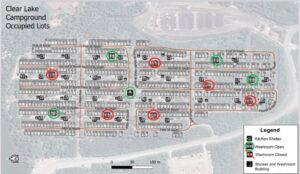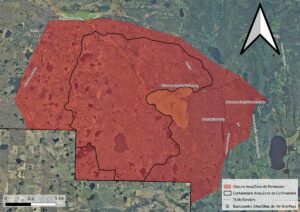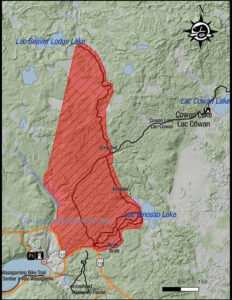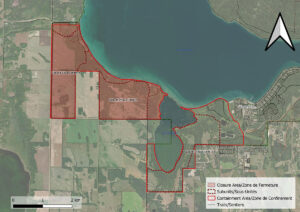AISNextStepshowwegothere
AIS Zebra Mussels eDNA Infographic_Feb22
I wanted to share information pertaining to the AIS inspection process for 2023.
We have identified key trailered boat tagging dates below which are also live on our Facebook page and website:
Wasagaming Main parking lot – May 25 and 27 from 2pm to 8pm.
Brandon Keystone parking lot – May 29, 30 and 31, 2pm to 8pm.
There will also be tagging and inspections available at the inspection station after this long weekend up until June 15th for trailered boats and self-propelled vessels as well. After June 15th it will be just for self propelled vessels for the rest of the summer season. A more detailed schedule to follow soon. The hours will move to 6am to midnight, 7 days a week to accommodate lake users. Check out the Q&A’s also attached for any looming questions.
If anyone has further AIS questions or comments, please send us an email to: [email protected]. We are responding to every email.
Finally, a mention of the inspection station hours for this weekend for self-propelled vessels only: Saturday, Sunday and Monday 10:30am – 6pm. But we will change those after the weekend.
Thanks for sharing this information for us. Have an awesome weekend!
Shane Robins
Pronouns: she/her
Pronom: elle
A/External Relations Manager, Riding Mountain National Park
Parks Canada / Government of Canada
135 Wasagaming Drive, Box 299, Onanole MB R0J 1N0
[email protected] / Tel: (431-362-0226)
Questions and Answers
Riding Mountain National Park
Changes to the AIS Program
Riding Mountain National Park is updating its aquatic invasive species program for 2023. Here are some of the main points you need to know.
These temporary changes for the 2023 boating season are being put in place to reduce the risk from aquatic invasive species (AIS). This is happening after the discovery of zebra mussel environmental DNA was discovered in Clear Lake. The changes are being made after extensive engagement with First Nations, other levels of government, the tourism industry, environmental NGOs, volunteer groups, anglers, boaters, paddlers, cottage and cabin owners and citizens. It became clear that the vast majority of organizations and individuals are concerned about the long-term health of the lake and support taking steps to protect it for the future.
Questions and Answers:
Q1. What is changing?
A1. The boating season for trailered boats will open Thursday, June 1, 2023. No trailered boats will be permitted to launch prior to that date.
· This is less than two weeks later than normal. This delay will permit RMNP to implement enhanced measures to protect against the threat posed by Zebra Mussels and other aquatic invasive species.
· The Martese and rental boats at the Clear Lake Marina will be inspected and permitted to operate before June 1, 2023, if they wish to do so.
To receive a permit, trailered vessels MUST:
· NOT have been in any other water body in 2023;
· PASS an initial inspection before June 15, 2023.
Boats that meet the requirements will have a tag installed that attaches the boat to their trailer. This tag assures park staff that the vessel has not been in another water body and poses no risk of bringing aquatic invasive species with it. If this tag is removed, cut, or tampered with, the boat will not be allowed to launch in Clear Lake for the remainder of the 2023 season.
Upon exiting Clear Lake, the operator will report to the inspection station to have a new wire attached to the boat and trailer. This will facilitate an easy subsequent launch if the cable is intact.
A cut-off date of June 15, 2023 will be in place, after which new seasonal permits for trailered boats on Clear Lake will not be issued. After that date, it is not possible to ensure that boats have not been in other lakes.
Operators of trailered boats which are used exclusively on Clear Lake are not required to take the Aquatic Invasive Species training as in past years. This course will be optional for them.
Launching will be permitted at the Boat Cove launch between the hours of 06:00 and 24:00, seven days per week.
Boat Cove is the only launch point that will be available for Clear Lake.
2 / 5
Q2. Why is Parks Canada changing the AIS Program?
A2. This is about protecting the long-term health of the waters in Riding Mountain National Park. Parks Canada is committed to protecting ecological integrity within national parks while providing high-quality and meaningful experiences to visitors.
The positive eDNA test for zebra mussels is a warning that prompts us to take additional precautions to try to prevent the arrival of zebra mussels. Parks Canada understands the long-term consequences of a zebra mussel invasion could have a significant impact for many stakeholders. We have heard clearly from most businesses, organizations, and other stakeholders in the area that they are concerned about the long-term health of the lake, and that protection from aquatic invasive species is the priority. This is precisely why Parks Canada is taking measures to continue to protect the ecological integrity of the lake which will also ensure its’ continued health for future generations.
· Zebra mussels have expanded their range in Manitoba and are now closer to RMNP. We know that several boats that were launched in RMNP in 2022 had come from lakes that were infested with zebra mussels and some even had adult mussels on them. We have also detected eDNA evidence at Boat Cove, so we can say with certainty that the risk level is now higher than in the past.
· We have a responsibility to protect RMNP from zebra mussels not only to protect the integrity of the Clear Lake ecosystem but also to protect the recreational, tourism and aesthetic values that Clear Lake provides to us all. Further, because Clear Lake is at the headwaters of the Little Saskatchewan River watershed, zebra mussels represent a real concern for downstream communities like KOFN, Minnedosa, Rapid City, Rivers, Brandon, and Portage la Prairie. Drinking water for 100,000 people as well as water for industry and agriculture and other recreational lakes could be negatively impacted by zebra mussels.
Q3. How will this affect the rights of First Nations?
A3. Parks Canada recognizes the rights of the Anishinaabe people to use their traditional territory. The people of the Keeseekoowenin Ojibway First Nation hold rights to harvest fish from Clear Lake. The changes to the 2023 program do not impede those rights.
Parks Canada is working to ensure healthy habitat in Clear Lake for fish species which has direct benefits to the harvesting rights of our partners.
Q4. How can I find out more information about the AIS Program changes?
A4. Follow our social media and webpages. Information will be updated as soon as available in these areas.
Information sessions regarding how to proceed as a lake user for 2023 are scheduled to take place at the following times and locations:
Tuesday, May 9, 7:00 pm– Dauphin Best Western Plus, 50 Eric Irwin Way, Dauphin, MB
Wednesday, May 10, 7:00 pm – Onanole Recreation Centre, 386 Central Rd, Onanole, MB
Thursday, May 11, 7:00 pm– Brandon University, 270 18th St, Brandon, MB
(Room CHO 212 is in the Clark Hall building on campus.)
For more information please contact: [email protected]
3 / 5
Q5. Are these changes permanent?
A5. Parks Canada is committed to the long-term health of Clear Lake. Changes to be implemented this year are interim measures. Any permanent changes to the Aquatic Invasive Species program will be subject to a further consultation process.
Q6. What is a trailered vessel?
A6. Any watercraft that requires a trailer for transportation ex. Pontoon boats, wake boats, sailboats, or fishing boats.
Q7. Why are trailered and motorized vessels considered high risk for transporting AIS?
A7. Trailered boats are more difficult to drain and have more places for AIS to hide. Self-propelled watercraft like canoes and kayaks are estimated to pose one-tenth the risk of spreading AIS compared to wind-powered or motorized boats.
Q8. Why is there a deadline to have my boat tagged? What if I can’t bring my boat to get tagged before the deadline?
A8. Zebra mussels become active as the water temperature increases and begin reproducing in late spring. By tagging trailered watercraft before June 15, 2023, we can ensure that the risk of AIS transfer is very low.
Boats that cannot meet the requirements by the deadline will not be able to launch in Clear Lake in 2023.
Q9. What happens if I decide to use a lake other than Clear Lake and remove my trailer tag?
A9. If you choose to remove your trailer tag at any point that vessel will no longer have access to Clear Lake for the 2023 season.
Q10. How does the trailer tag work? Will it damage my boat?
A10. Parks Canada staff will attach a wire tag to your trailer and vessel to ensure that the vessel only enters Clear Lake. Attaching and removing tags will not damage your trailer or vessel.
Q11. Will there be a cost for the trailer tag?
A11. There is no cost to visitors for inspections, decontaminations, or participation in trailered vessel tagging.
Q12. What are the rules for self-propelled watercraft (kayak, SUP, canoe, etc.)?
· Self-propelled watercraft must have a permit for every launch at any lake in RMNP. Self-propelled watercraft operators must report to the inspection station at the Boat Cove to have their craft inspected and receive a permit.
· Self-propelled watercraft operators may take the seasonal Aquatic Invasive Species Prevention on-line training which will be offered again in 2023 as in previous years. Upon successful completion of this training, a self-propelled watercraft operator may receive a seasonal permit and seasonal sticker which enables them to bypass the inspection when they wish to launch their boat. Course offerings will be communicated asap.
Q13. Why is Parks Canada making these changes for trailered vessels. Is the park anti-motorboat?
A13. RMNP is not anti-motorboat. We recognize that motorboat operators care about Clear Lake and have a long history of responsible use and stewardship in Clear Lake. Unfortunately, trailered boats have
4 / 5
been the main cause of zebra mussels range expansion in North America since they were first introduced into the Great Lakes in the 1980s. We recognize that most operators of trailered boats support and comply with Clean/Dry/Drain protocols, but unfortunately, some do not. This plan has been developed so that we can still provide motorboating to operators who stay in Clear Lake. Unfortunately given the increased risk of zebra mussel infestation, RMNP has had to exclude motorboats that come from other lakes.
· Trailered motorboats are much more difficult to inspect or drain and dry completely. Some contain compartments that are impossible to dry or decontaminate.
Q14. Why won’t you open East End launch? What if it is too rough to launch at Boat Cove?
· To provide a full service at Boat Cove, we need to consolidate our staff there
· If it is too rough to launch at boat cove, then for safety’s sake we urge people to reconsider their decision to launch their boat.
Q15.What if I must get off the lake in a hurry due to bad weather/storms?
A15. We urge operators to be aware of weather conditions, particularly on those hot mid-summer afternoons when thunderstorms often occur, and to leave the lake early to avoid potential storms.
Q16. What about late and early launchings/exiting? – how do I get my boat out of the water and get a new tag if I come in late?
A16.
· Hours of operation at Boat Cove have been increased
· Boaters need to be aware
· Will have personnel on-site to attach tags late
Q17. What are you doing to reduce congestion at Boat Cove?
A17.
· Increased hours of operation
· Tagging system will eliminate the need for inspections/decontaminations of trailered boats
· Always interested in suggestions
·
Q18. Closure of Lake Audy and Moon Lake – Why?
A18.
· They are both headwaters and can impact downstream communities
· Can’t manage inspection stations at multiple sites
· Trailered boat use is low
Q19. Aren’t zebra mussel infestations inevitable anyway?
A19. No. Unlike provincial agencies which are dealing with millions of lakes and must therefore rely on legislation and compliance, RMNP is in the fortunate situation of being able to control access and run an inspection station. This is particularly important because RMNP is at the headwaters of several watersheds. While it remains possible that zebra mussels could enter park waters, we believe we can prevent it with help from an educated and supportive public.
Q20. What if I can’t get my boat in to be inspected before June 15?
5 / 5
A20. RMNP will be offering many ways for boats to be inspected and tagged prior to the season, including pre-season tagging sessions at Wasagaming and possibly elsewhere depending on demand. RMNP will also, if requested by the owner (via a commercial storage operator) visit storage locations and tag boats there if demand is sufficient. It will be the operator’s responsibility to contact their storage operator who can then contact RMNP to arrange a tagging session.





 Parks Canada is planning prescribed fires between April 24, 2023, and May 31, 2023, in three areas of Riding Mountain National Park, weather permitting.
Parks Canada is planning prescribed fires between April 24, 2023, and May 31, 2023, in three areas of Riding Mountain National Park, weather permitting.